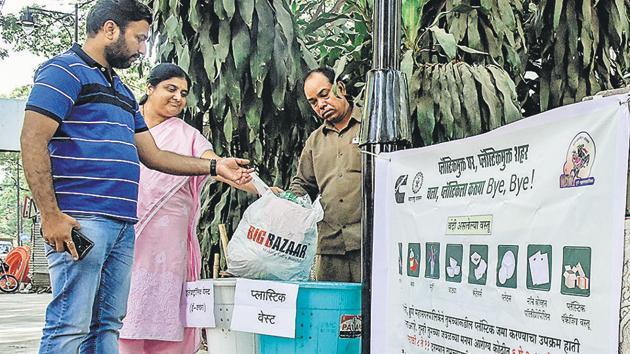Public cooperation key to campaign against plastic
Instead of targeting all single-use plastic products at once, most countries have prioritized what they will ban or phase out, which possibly helps consumers and manufacturers get used to changing consumption patterns.
India is only now considering a voluntary phase-out of all single-use plastics, but over 60 countries have, since the early 2000s, used a mix of bans and levies to deal with the menace of disposable plastics.

Africa has the largest number of countries that have implemented a complete ban on production and use of plastic bags. Rwanda is the most successful among them, according to the United Nations Environment Programme’s Single-use Plastics—A Road to Sustainability report released last year.
”Rwanda is a pioneer in banning single-use plastic bags and is now one of the cleanest nations on earth,” the report said.
The Rwandan government banned the manufacturing, use, sale and import of all plastic bags in 2008. Paper bags and reusable cotton bags replaced plastic ones after the ban. Incentives were also offered to companies willing to invest in plastic recycling equipment or in the manufacturing of environment-friendly bags.
But many countries have not succeeded in reducing their single-use plastic footprint. Out of the 60 countries that have put in place a legal policy to deal with single-use plastic, there is no information on whether the measure has had any impact on reducing use of disposable plastics in half of them.
Roughly 30% of the countries documented drops in plastic pollution and consumption within one year of the national ban or levy being imposed, and 20% reported no or little impact.
Interestingly, the UNEP report identified public-private partnerships and voluntary agreements as effective mechanisms to reduce consumption of single-use plastic. Over time, populations may change consumption patterns through social pressure and voluntary strategies (similar to what India is considering), said the report.
However such strategies have to be supplemented with incentives to industry and uptake of eco-friendly alternatives.
For instance, Austria in 2016 signed an agreement with large retailers and environmental protection organizations to reduce the use of plastic carry bags. As of January 2017, most of Austria’s large supermarket chains had voluntarily stopped providing free plastic bags to customers. Some supermarkets are offering reusable bags that can be bought at the checkout counters.
Bans have failed in many countries for lack of enforcement. South Africa in 2003 introduced a ban on plastic bags with thickness of less than 30 microns. A nominal levy was also imposed on retailers but the levy was reduced soon after because of pressures from the plastic industry. The levy was largely ineffective.
Bangladesh banned plastic bags in 2002 after the government concluded that the bags had exacerbated the impact of floods in 1989 and blocked drainage systems in 1998. Bangladesh also stipulated fines of up to $71 and six months in jail but the ban was not enforced and plastic bags are still widely used.
“As soon as you land in Rwanda the security snatches away the plastic you are carrying. So they don’t let any plastic bags enter their country. The ban has been enforced very strictly,” said Swati Singh Sambyal., the programme manager (waste management) at the Centre for Science and Environment.” They also have exchange systems in stores where you can pay and take a bag and return it later. Mostly cloth and jute bags are being used as alternatives. A similar ban in Kenya however didn’t work well because it was not enforced well.”
In Sweden, since the 1970s grocery stores have been charging consumers for plastic bags.The Swedish system of collection of plastic bags from consumers and recycling of waste is also impressive, added Sambyal.
CK Mishra, secretary, ministry of environment, said: “Sweden has a very interesting model where almost all plastic waste gets recycled. We will see how they have done it.”
Instead of targeting all single-use plastic products at once, most countries have prioritized what they will ban or phase out, which possibly helps consumers and manufacturers get used to changing consumption patterns. New York, for example, banned single-use Styrofoam containers in 2015 but it was lifted after recycling firms and plastic manufacturers challenged it. The ban was reinstated in 2017. In the US, states like Michigan, Idaho, Arizona and Missouri, laws have been enacted prohibiting local governments from banning disposable plastics, allegedly to protect the plastic industry, the UNEP report said
At least 29 states and Union territories in India have put in place some regulation on use and disposal of plastics. The Plastic Waste Management Rules 2016 also prohibit use of plastic bags of less than 50 micron thickness, but the law hasn’t been enforced well, according to experts.






